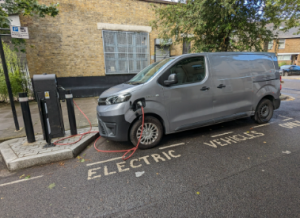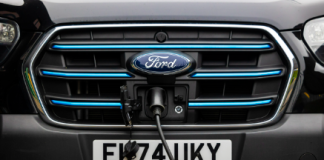Electric vans must continue to be exempted from Congestion Charge changes, campaigners have argued after new data showed their diesel counterparts are now the biggest road source of harmful NOx emissions in Central London.
Figures from the London Atmospheric Emissions Inventory (LAEI) showed that diesel vans pumped out 108 tonnes of the air pollutant in 2022 – far higher than taxis at 78 tonnes and cars at 60 tonnes.
They contributed 30.2 per cent of all NOx emissions in Central London, the largest of any transport type, according to the analysis from Clean Cities.
NOx emissions create NO2, a toxic gas which can irritate the lining of people’s airways and make people more at risk from asthma attacks.
The figures have prompted further calls for City Hall and Transport for London (TfL) to rethink ending the Congestion Charge exemption for electric vehicles from 2026 – especially those operated by charities or small businesses. Stakeholders have suggested that refusing to keep up the financial incentive will see more people switch back to diesel – setting back the Mayor’s environmental goals.

Image: LDRS
From 2 January, electric vans will only receive a 50 per cent discount, meaning they could pay up to £9 every time they enter the Congestion Charge Zone under proposed changes.
Zak Bond, Clean Cities Campaign Manager, said: “This new data shows we need to see much more action to tackle the dirty air coming from vans in our city. The Mayor of London and London Boroughs must act to push forward the use of electric vans and cargo bikes.
“A first step should be a 100 per cent Congestion Charge discount for electric vans run by charities and small businesses.”
Almost 100 charities and businesses have now sent a letter to Mayor of London Sadiq Khan telling him that the changes will both “hit small businesses and charities hard” as well as “setting London’s climate ambitions back”.
The text, seen by the Local Democracy Reporting Service (LDRS), says: “Under your current proposals, small businesses and charities who have done the right thing by investing in electric vans will face a new daily charge of £9. This could add more than £3,000 to the annual running costs of each electric van. Some of them may even have to shift back to diesel to make ends meet.
“This financial strain will also discourage the future uptake of electric vans, undermining your health and environmental targets.”
It is signed by major stakeholders such as The Felix Project and the Trussell Trust.
Taxis were previously the worst offender in the previous LAEI analysis from 2019 but it is believed the increasing electrification of the fleet has seen their proportion of pollutants emitted fall from 28.4 per cent to 21.7 per cent.
The percentage of NOx emissions from cars, HGVs and coaches in the capital also saw a fall in the three years between 2019 and 2022.
Ben Pearce, Head of the Health effects of air pollution programme at Impact on Urban Health, added: “They may seem commonplace, but diesel vans have profound effects in urban areas, and those effects are not felt evenly.
“Air pollution disproportionately harms racialised communities, people on lower incomes, and children. In London alone, diesel van deliveries carry hidden health and environmental costs of more than £2billion every year.”




